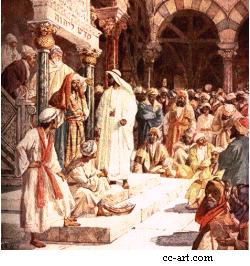Judge me, O God
News of the Order and commentary appear after the Proper Collect, Epistle and Gospel
Passion Sunday
The Fifth Sunday in Lent
Passiontide
Homily of Augustine on Psalm XLII
WE beseech thee, Almighty God, mercifully to look upon thy people; that by thy great goodness they may be governed and preserved evermore, both in body and soul; through Jesus Christ our Lord. Amen.
Source: Sacramentary of Gregory, Bishop of Rome [600 AD]. The people here was familia in Latin.
ALMIGHTY and everlasting God, who hatest nothing that thou hast made, and dost forgive the sins of all those who are penitent; Create and make in us new and contrite hearts, that we, worthily lamenting our sins and acknowledging our wretchedness, may obtain of thee, the God of all mercy, perfect remission and forgiveness; through Jesus Christ our Lord. Amen.
Isaiah i. 10, Psalm 42, 43 | 119:145–176 , Hebrews ix. 11, St. John viii. 46.
Homily of Augustine on Psalm XLII
Which of you convinceth me of sin?

BULLETIN
quotation
This was the water for which the soul of David thirsted. The hart desires the fountain of these waters, not thirsting for the poison of serpents. For the water of the grace of the Spirit is living, that it may purify the inner parts of the mind, and wash away every sin of the soul, and purify the transgression of hidden faults.
[Ambrose, referring to Living Waters and Psalm XLII, in Ch XV, Book 1, to the Emperor Gratian]
news
Vatican rules out 'feminist' baptism formula . Another heresy suppressed.
"Was Jesus in a Sexual Relationship with the Beloved Disciple?" by Robert Gagnon professor of NT at Pittsburg Theological Seminary. A good and short apology against this recent attack against the Church.
He that hath an ear, let him hear what the Spirit saith unto the churches.
Praying in the name of Jesus in Tulsa. The Tulsa City Council has lifted its ban on "sectarian" prayers; [Jn 15:16]
Early Christian Writers – Links to works chronologically arranged. Very good resource for the student of the Early Church.
commentary
Passiontide is the short season that marks the last two weeks of the Lenten Fast. It begins on Passion Sunday.
This Sunday is also know as Judica Sunday (Judge me, O God) for the intoit from Psalm 43 that is traditionally said on this Sunday and was not appointed to be said again on any day until after Easter. The Sarum Rite of the middle ages signified the season with crimson-colored vestments.
This week we examine Psalm 42. The quotation of Ambrose addresses it, as does Augustine's homily. His comment, on verse 6, is especially appropriate in this season of Lent.
"My soul is disquieted on account of myself"
Is it disquieted on account of God? It is on my own account it is disquieted. By the Unchangeable it was revived; it is by the changeable it is disquieted. I know that the righteousness of God remaineth; whether my own will remain stedfast, I know not. For I am alarmed by the Apostle's saying, "Let him that thinketh he standeth, take heed lest he fall." [1 Cor. x. 12] Therefore since "there is no soundness in me for myself," there is no hope either for me of myself. "My soul is disquieted on account of myself."..."Therefore I remember Thee, O Lord, from the land of Jordan, and from the little hill of Hermon." From whence did I remember thee? From the "little hill," and from the "land of Jordan." Perhaps from Baptism, where the remission of sins is given. For no one runs to the remission of sins, except he who is dissatisfied with himself; no one runs to the remission of sins, but he who confesses himself a sinner; no one confesses himself a sinner, except by humbling himself before God. Therefore it is from "the land of Jordan I have remembered thee, and from the hill;" observe, not "of the great hill," that thou mayest make of the "little hill" a great one: for "whoso exalteth himself shall be abased, and whoso humbleth himself shall be exalted." If you would also ask the meanings of the names, Jordan means "their descent." Descend then, that thou mayest be "lifted up:" be not lifted up, lest thou be cast down. "And the little hill of Hermon." Hermon means "anathematizing." Anathematize thyself, by being displeased with thyself; for if thou art pleased with thyself, God will be displeased with thee. Because then God gives us all good things, because He Himself is good, not because we are worthy of it; because He is merciful, not because we have in anything deserved it; it is from "the land of Jordan, and from Hermon," that I remember thee. And because he so remembers with humility, he shall earn his exaltation to fruition, for he is not "exalted" in himself, who "glories in the Lord."
No comments:
Post a Comment